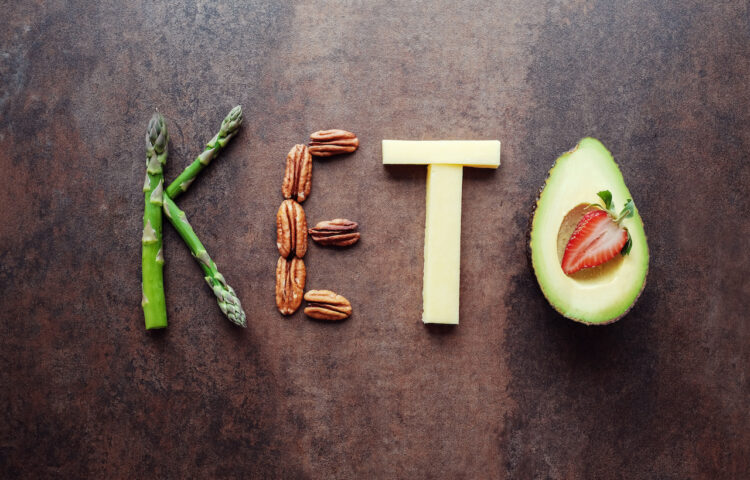The ketogenic diet, or keto for short, is a popular low-carb, high-fat diet that has been shown to promote weight loss and improve overall health. However, following a keto diet can come at a cost, both in terms of money and time.
You’ve seen plenty of meal delivery services, but perhaps you’ve wondered, “Where in the world are the keto meals?” Catered Fit offers healthy keto meals that are ultra low carb, moderate protein and high fat, ideal for weight loss on a ketogenic diet. Enjoy fresh keto meals such as a Blackened Mahi Mahi Lettuce Taco with Cilantro Cream with your Catered Fit meal delivery plan.
What is a Keto Diet?
A ketogenic, or keto, diet is a very low carb, high fat diet intended to put your body into a metabolic state called ketosis. During ketosis, the body burns through fat and turns it into energy.
Those following a keto diet generally eat less processed foods since it requires eating very few carbohydrates. This has been found to be great for controlling type 2 diabetes and lowering insulin and blood sugar levels.
Studies have found the keto diet to be extremely effective for weight loss and especially in eliminating dangerous belly fat. It has also been shown to lower cholesterol, lower blood pressure and is effective for appetite control.
A nutritionist has designed our keto meals so that you don’t have to do any macro counting yourself. These meals are designed to get you into ketosis as fast as possible and keep you there for as long as you follow the plan so that you reach your goal weight! It’s imperative that while on the keto diet, you ONLY consume keto meals or snacks. Stay away from high carb drinks and be sure to drink plenty of water. Keto meals should NOT be mixed in with other “normal” meals as this will simply increase your total fat intake, without lowering your carbohydrate intake, therefore not allowing you to reach the fat burning state of ketosis.
In this blog post, we’ll explore the costs associated with following a keto diet and whether it’s worth the investment.
Cost of Food
One of the most significant costs associated with following a keto diet is the cost of food. Since the diet emphasizes high-quality, whole foods, the cost of groceries can add up quickly. High-fat foods such as avocado, nuts, and grass-fed meats can be more expensive than their lower-fat counterparts.
To mitigate the cost of food, it’s important to shop smart and look for deals on high-quality, keto-friendly foods. Buying in bulk, shopping sales, and purchasing seasonal produce can help reduce costs.
Cost of Supplements
Some individuals may choose to supplement their keto diet with additional vitamins and minerals to ensure they are meeting their daily nutrient needs. Supplements such as magnesium, potassium, and omega-3s can be costly, particularly if you opt for high-quality, bioavailable supplements.
While supplements can be helpful, they are not always necessary. A well-rounded keto diet can provide most, if not all, of the necessary nutrients.
Cost of Kitchen Equipment
Following a keto diet may require additional kitchen equipment, such as a high-powered blender, food processor, or air fryer. While these tools can make food preparation easier and more enjoyable, they can also be costly.
Investing in high-quality kitchen equipment can be a worthwhile investment in the long run, as it can save time and effort in food preparation. However, it’s important to weigh the cost against the benefit and consider whether the equipment is truly necessary.
Time Investment
Following a keto diet can require a significant time investment, particularly in the beginning stages when meal planning and food preparation may take longer than usual. It’s important to consider the time commitment necessary to follow a keto diet and whether it fits into your lifestyle.
While it can be time-consuming, many individuals find that the benefits of a keto diet, such as improved energy and mental clarity, are worth the investment.
Medical Costs
For individuals with certain health conditions, a keto diet may require medical supervision or consultation. This can come at a cost, particularly if insurance does not cover the expense.
It’s important to consult with a healthcare professional before starting a keto diet, particularly if you have a history of medical conditions. The cost of medical consultations should be factored into the overall cost of following a keto diet.
In conclusion, following a keto diet can come with costs, both in terms of money and time. However, for many individuals, the benefits of improved health and weight loss are worth the investment. By shopping smart, investing in high-quality kitchen equipment, and consulting with a healthcare professional, it’s possible to follow a keto diet without breaking the bank.

